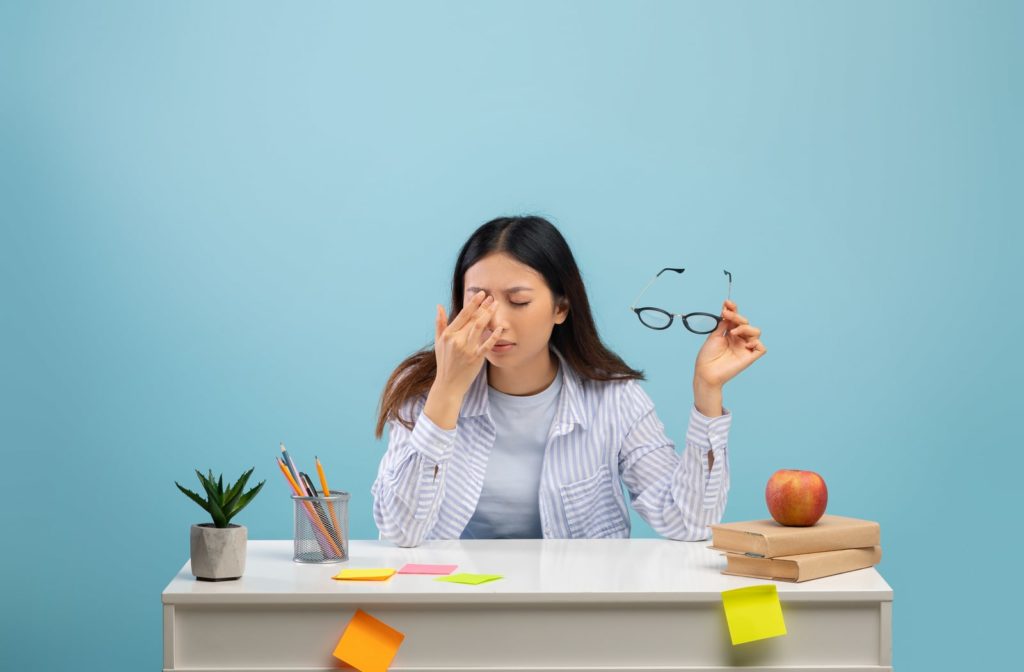When you’re dealing with dry eyes, the first thing that comes to mind is treatment and getting better. Dry eye disease can cause discomfort, and your optometrist has all sorts of treatment methods available to you.
But what causes dry eye disease? And is stress a factor? Let’s look at dry eye disease, its symptoms, its main causes, and treatment methods.
What Is Dry Eye Disease?
Dry eye disease is a common condition that appears when your tears cannot provide enough lubrication for your eyes. Your tears can be inadequate or unstable if you produce poor-quality tears, leading to inflammation and damage to your eye’s surface.
Dry eye symptoms can affect your productivity and decrease your quality of life. Getting work done or enjoying your favorite activities while your eyes are dry and itchy is a tall task.
Some symptoms of dry eye disease include:
- Red eyes
- Itchy or stinging sensations
- Watery eyes
- Sensitivity to light
- Stringy mucus
- Difficulty driving at night
Coming across these symptoms is a good indication of dry eye disease. While it’s possible that these symptoms may fade away and correct themselves, if prolonged symptoms persist, getting in touch with your optometrist is advised.
Your optometrist will conduct a comprehensive eye exam if you’re experiencing any of these symptoms to rule out any eye diseases that have similar symptoms.
Dry Eye Treatment
With something uncomfortable like dry eye disease getting treatment as soon as possible is in your best interest.
Some general treatment methods for dry eye disease include:
- Eye drops, which are one of the most common treatments
- Punctal plugs that your doctor can provide as a more permanent solution
- Using a humidifier at home to improve your environment
- Limiting time staring at a screen for long periods
- Good eyelid hygiene
It’s essential to treat dry eye disease as soon as possible—if left untreated, dry eye disease can lead to more serious vision conditions such as:
- Corneal ulcers
- Eye infections
- Eye inflammation
- Corneal abrasions
Getting treatment starts with consistency and maintaining your eye exam schedule.
Intense pulsed light therapy (IPL) is a popular and safe treatment option.
IPL therapy is an excellent option for people dealing with dry eye disease caused by meibomian gland dysfunction. IPL therapy uses light energy to warm the meibomian glands to liquefy any blockages and target blood vessels around your eye to decrease inflammation.
Some benefits of IPL therapy include:
- Noninvasive
- Very few complications
- Results can be maintained
- Well-tolerated by most people
Causes of Dry Eye Disease
There can be several causes of dry eye disease, but almost all fall under 2 separate categories: insufficient tear volume and poor tear quality.
Your tear film consists of 3 layers: fatty oils, aqueous fluid, and mucus. This combination keeps your eyes lubricated, and any interruption to these layers can lead to dry eyes.
Decreased tear production indicates that dry eye disease may be making an appearance.
Reasons for decreased tear production include:
- Normal aging
- Medications such as antihistamines or antidepressants
- Frequent contact lens wear
- Nerve damage caused by eye surgery
- Vitamin A deficiency
Another cause can be meibomian gland dysfunction.
Meibomian glands play a crucial part in maintaining the integrity of the tear film along your eyelids. Meibomian glands release oil to reduce the evaporative process in the eyes. Blocked meibomian glands don’t secrete enough quality oil to keep your tears from evaporating and can lead to meibomian gland dysfunction.
Your overall lifestyle can also play a role. Smokey, windy, and dry environments can contribute to dry eye disease.
Can Stress Contribute to Dry Eye Disease?
The technical aspect of dry eye disease is well known, but can stress contribute to dry eye? Technically the answer is yes; however, this requires further explanation.
Stress can exacerbate your already existing dry eye and result in an aggravation of your anxiety. Stress can go unnoticed, and because everyone deals with stress, it can be an understated cause of dry eye disease.
The causing factors of dry eye can be made worse with neglect, which can stem from the stress that dealing with dry eye disease symptoms can bring. Ignoring these symptoms can result in a prolonged state of discomfort and sometimes more severe vision conditions.
Each blink can be irritating and uncomfortable for people with dry eyes, so finding relief can become necessary to alleviate any stress from the condition.
Being Cautious with Dry Eye Disease
Dealing with dry eye disease is almost always an unpleasant experience. Seeking treatment as soon as possible is essential. Stress can be a sneaky contributing factor to dry eye and can often go unnoticed.
Book an appointment with your optometrist today to learn more about dry eye disease and get treatment.



